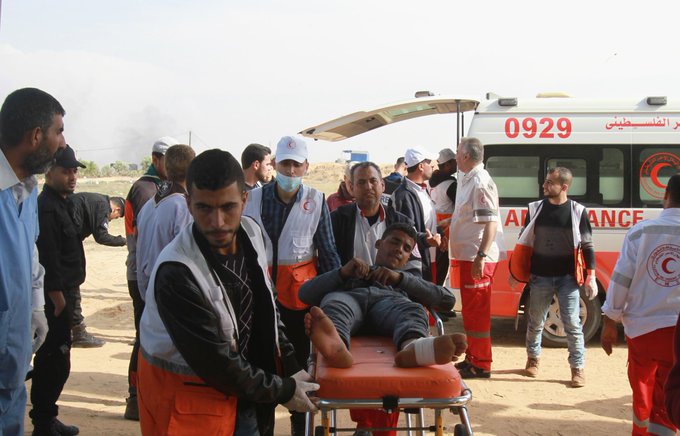The benevolent bureaucrats of military occupation

- 26 December 2018
 Israeli occupation bureaucrats shamelessly exploit Palestinian patients from Gaza to present their military rule over a besieged people as benign or even benevolent.
Israeli occupation bureaucrats shamelessly exploit Palestinian patients from Gaza to present their military rule over a besieged people as benign or even benevolent.
 Israeli occupation bureaucrats shamelessly exploit Palestinian patients from Gaza to present their military rule over a besieged people as benign or even benevolent.
Israeli occupation bureaucrats shamelessly exploit Palestinian patients from Gaza to present their military rule over a besieged people as benign or even benevolent.
One recent video published on Facebook by COGAT – which stands for Coordination of Government Activities in the Territories – presents the “incredible story” of Ahmad, a Palestinian child from Gaza who was flown to India for a lung transplant.
The video states that the 15-year-old boy “was always treated respectfully in Israel,” where he has been hospitalized multiple times since his condition was diagnosed 10 years ago.
Ahmad, whose access to life-saving treatment is dependent on the approval of COGAT – which, despite its anodyne name, is an Israeli military body that controls the movement of millions of people – appears in the video alongside his father, testifying to the good care he received in Israel.
“There was no problem in that respect,” the father says.
Denied access to treatment
Close observers of Israel’s control over Gaza – and the Palestinians who have been subjected to it – would be forgiven for reading between the lines and suspecting that the boy and his family have had problems in other respects regarding the child’s treatment.
Last year, 54 patients were known to have died while awaiting Israeli permits to leave Gaza for medical treatment.
This year, some 800 Palestinians in Gaza were barred from traveling under a directive that denied patients access to medical treatment in the West Bank and Israel over alleged ties to Hamas members.
The Israeli government directive was issued in early 2017 to put pressure on Hamas to release two Israeli civilians believed to be held by the group and to return the bodies of two soldiers killed in Gaza during the 51-day military offensive in the territory in 2014.
The family of one of the slain soldiers had demanded that the government reduce the number of exit permits for Palestinians seeking to leave Gaza for humanitarian reasons.
That directive was canceled by Israel’s high court after being challenged by human rights groups.
Now human rights groups are petitioning the court over another form of collective punishment being used against medical patients in Gaza.
A girl the same age as Ahmad, the boy in the COGAT video, is among hundreds of patients in Gaza who have been denied access to treatment on the basis that they have a relative staying in Israel or the West Bank without a permit.
Israel is conditioning their permits on the return of those relatives to Gaza.
According to the rights groups challenging the policy, Israel is claiming in some cases that patients “would illegally move their residence to the West Bank” if they were granted permits.
Al Mezan Center for Human Rights and Physicians for Human Rights Israel, the groups petitioning Israel’s high court, note “a significant increase in the number of refusals on this ground in 2018 compared to 2017.”
More than 400 medical patients were denied permission to travel on these grounds between the beginning of the year and late October.
Those patients include a 61-year-old father of 11 with an eye condition who was denied a permit because one of his nephews has been living in the West Bank.
Asma Majdalawi, a 15-year-old with a dangerous blood clot, was refused a permit to travel to a Tel Aviv hospital because she has two brothers residing in the West Bank.
“Making the permit contingent on the return of another – as close to the patient as he or she may be – represents illegitimate pressure and an illegal and immoral tactic,” Al Mezan and Physicians for Human Rights stated.
Cruel reality
The cruel reality endured by patients in Gaza bears little resemblance to the feel-good propaganda put out by COGAT.
It is unlikely that COGAT will be producing any videos about how Israeli authorities barred the transfer of vaccines for children to the West Bank and Gaza.
But that too is the real story of healthcare for Palestinian children growing up under Israeli occupation.


 هيذر شارونا
هيذر شارونا